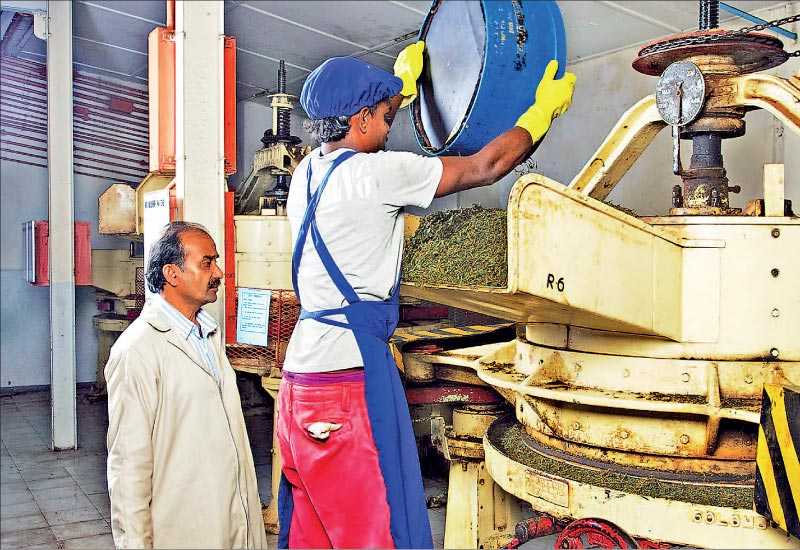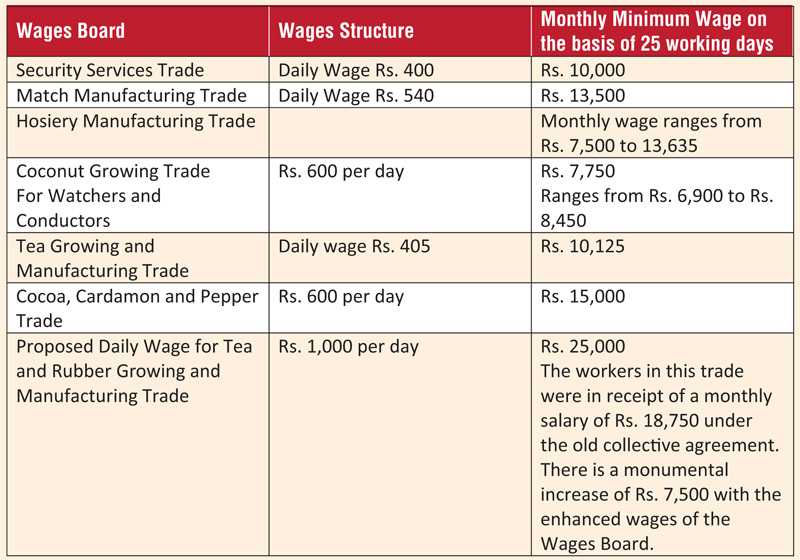Tuesday Feb 24, 2026
Tuesday Feb 24, 2026
Friday, 12 March 2021 01:00 - - {{hitsCtrl.values.hits}}

Both the tea and rubber industries are on the verge of collapse owing to heavy financial implications and it is not clear as to how they will absorb this unforeseen expenditure – Pic by Shehan Gunasekara
 This addendum to the topic is based on the incisive analysis of the ‘Plantation Wages: Collective bargaining or otherwise’ article by Gotabaya Dasanayaka (GD) in The Daily Financial Times of 1 March 2021. The eminent labour legislation specialist, former Director General of the Employers Federation of Ceylon (EFC) has most undoubtedly hit the nail on the head drawing the attention of the readers to more sensitive aspects revolving round the importance of the time-tested collective bargaining systems prevailed in the determination of wages of the plantation workers for over three decades in particular as well as to the possible economic consequences, the new wage structure gives rise to the survival of the plantation industry in general.
This addendum to the topic is based on the incisive analysis of the ‘Plantation Wages: Collective bargaining or otherwise’ article by Gotabaya Dasanayaka (GD) in The Daily Financial Times of 1 March 2021. The eminent labour legislation specialist, former Director General of the Employers Federation of Ceylon (EFC) has most undoubtedly hit the nail on the head drawing the attention of the readers to more sensitive aspects revolving round the importance of the time-tested collective bargaining systems prevailed in the determination of wages of the plantation workers for over three decades in particular as well as to the possible economic consequences, the new wage structure gives rise to the survival of the plantation industry in general.
Industrial Dispute Act No. 43 of 1950 (ID Act)
The ID Act quite explicitly deals with the functions of the Commissioner of Labour (CL) under part 11 of the Act which says when an industrial dispute arose, it shall be the duty of the CL to refer such disputes for settlement by conciliation or by arbitration or by an Industrial Court including that of a District Court. It should be noted here that neither the Minister in charge of Labour nor the Commissioner of Labour (CL) nor the Deputy Commissioner of Labour (Industrial Relations) nor any other authorised person seems to have gumption to abide by aforesaid conciliatory methods as envisaged in the ID Act, when the collective bargaining process of the plantation workers came to a deadlock a few weeks ago.
The most sensible course of action that the Minister or the CL should have taken was to recourse the dispute in question to a compulsory arbitration as per the provisions of the ID Act for a just and equitable award as articulated by GD. The reluctance on the part of the Minister to refer this sensitive issue to the compulsory arbitration is a moot point. Probably, he may have thought that the decision of the arbitration would not be favourable to the trade union demands. On the other hand, he may have thought that the reference to the arbitration is a time-consuming affair and the trade unions agitation is too severe to be ignored.
However, it is crystal clear that the Minister had totally condemned the gist of the ID Act in toto by referring it to the Wages Board by circumventing all the bottlenecks in the pipeline for the first time in the history by creating a new precedent. It must be stated here that nowhere in the ID Act that an unfettered latitude is granted for the Minister to refer this labour dispute to the Wages Board. It is highly questionable as to why the Regional Plantation Companies did not challenge the Labour Minister’s arbitrary decision by way of a writ before the court and finally bore the brunt of the unconscious increase of the wages, which has far-reaching ramifications over the plantation industry and the smallholder sector.
Wages Board Ordinance (WBO)
Under Section 8 of the WBO, the minister is empowered to establish Wages Board (WB) for any trade. It is a tripartite constituency representing the officials of the labour department, employers and employees of a particular trade. At present, there are 45 wages boards for different trades including that of plantation, agriculture and manufacturing industries and they receive minimum wages protection under this WBO. As regards the plantation sector, employees of rubber plantations 25 acres and above, coconut plantations 10 acres and above and tea plantations – no limit on acreage are protected by the WBO. Though WB has been in existence for the last seven decades, the collective bargaining process initiated by the ID Act and the WBO functioned in tandem without interfering in each other’s territory.
As a matter of fact, collective bargaining process is more instrumental among the more organised sector where collective agreements are in force. By and large, the wage structure in the organised sector where collective bargaining operates is far superior to that of the establishments covered by the Wages Board. The minimum wages paid to employees covered by the WBO are conspicuously lower than the wages paid under the collective agreements. The wages boards are considered to be subsistence level wages as referred to above and in sectors where the trade unions are virtually non-existent. Hence, it is unprecedented that a matter which is subject to collective agreement was referred to the Wages Board by the Minister of Labour in the annals of the labour movement of this country without realising the repercussions that could arise.
It is true that the plantation workers were covered by a Collective Agreement and periodically it has been renewed after collective bargaining. In a matter covered by Collective Agreement, if any dispute arose, the matter should have been referred to compulsory arbitration under the ID Act. However, in this instance, it is surprising that the issue was referred to the relevant wages board at the instance of the Minister of Labour. The Labour Minister’s arrogance to refer this sensitive issue to the Wages Board is most unethical in it would create a bad precedent and an irreversible blow in the furtherance of industrial relations in the plantation sector.
Wage impact on the industry
GD in his well-articulated article made a comparison between the wage structure of the different wage boards in selected trades and the proposed daily minimum wage for the tea and rubber growing and manufacturing trades and pointed out the huge disparity, if the proposed daily minimum wage of Rs. 1,000 is paid across the board. Both the tea and rubber sectors are owned 70% by the smallholders, definitely the proposed increase will have a deleterious impact on the productivity of the tea and rubber sectors and the smallholders can ill-afford to bear the increased wage at this juncture.
Right at the moment, a large number of rubber smallholders in Kegalle, Kalutara and Ratnapura districts have abandoned their plots in the face of the existing wages and the dearth of labour. Right at the moment, Regional Plantation Companies (RPCs) make a desperate attempt to contain the high cost of production and there will be an inevitable impact-detrimental to the wellbeing of the industry, in the face of the enhanced wages approved by the Wages Board.
GD in his article had incorporated the minimum wages applicable to selected eight trades to pinpoint the irrational disparity of wages and I would go further to highlight the inadvisability of enhancing wages through the wages board mechanism to maintain healthy industrial relations and a healthy industrial peace and harmony for the last 30 years. Moreover, the sustainability of the industry and the commercial viability on the basis of labour productivity, profitability and the efficiency of operations were some of the key prime-movers at the collective bargaining table, which both parties took cognisance of seriously.
Every Dick, Tom and Harry knew quite well that the Government made a solemn pledge at the Presidential Election as well as the last Parliamentary Election that the daily wage of the estate workers would be enhanced to Rs. 1,000 as per the election manifesto (Chapter 10 of the Vistas of Prosperity and Splendour). It is this pledge that the Government had to initiate at the last Annual Budget at the instigation of the labour trade unions in the estate sector.
Obviously, there are many obstacles both statutory and bureaucratic in the implementation of this pledge. The Commissioner of Labour (CL) who was well versed in the sustainability of the estate sector and the procedural initiatives involved as per the ID Act and Collective Bargaining Process was seen as a stumbling block and he had to be booted out by installing a provincial bureaucratic who was absolutely unaware of the commercial viability of the plantation sector, which is associated with many operational and financial ills.
It must be stated here in fairness to the former Commissioners of Labour in the calibre of G. Weerakoon and Mahinda Madihahewa who had served the labour department with distinction adroitly and they did not succumb to the political pressure and had the capacity to appraise both sides when critical labour issues arose in fairness to both parties but they relied heavily on the sustainability of the industry on a more priority basis in solving labour disputes.
The Government realised that the collective bargaining process outlined in the ID Act was an impediment to the smooth implementation of the proposed wage structure. So, the government insidiously shifted from the time-tested mechanism of collective bargaining process to Wages Board to expedite the process. According to the grapevine circulating in the Labour Secretariat that three strong party acolytes were brought in as nominated members of the Minister to the Wages Board in order to ensure the easy passage of wage increment of Rs. 1,000.
Future trends of the Labour Movement
From the pattern of the signals hitherto displayed by the Government that came into power in 2019, it appears that every vibrant sector would be confronted with insurmountable labour agitations. Firstly, the industry has been agitating to do away with the obnoxious requirement of paying Rs. 200,000 in case of terminations under the Employment of Termination Act. The employers pointed out over a decade of time that it was difficult to bring in foreign investment with such a legislation. The Government did a U Turn by enhancing the payment of compensation to Rs. 400,000 instead of scrapping this piece of legislation.
Secondly, the amount of workmen compensation in the event of a death of an employee due to a fatal accident was increased almost double, placing more financial burden to the employers at the instigation of the trade unions. The third scenario was the manner in which it deviated from the time-tested collective bargaining mechanism and imposed unbearable financial constraints by way of enhanced wages to the employees of the plantation industry. The industry is unaware of any other ill-logical motives to be moved in the pipeline against the wellbeing of the industry in the foreseeable future. What would happen if the rest of the Wages Boards request enhanced wages quoting the unprecedented mechanism adopted by the Government and the resultant chaos would be inevitable.
Unlike those days, the trade unions have become more aggressive with their political affiliations with the Government and the civil society too have extended their support to trade unions to win over their demands, as can be seen from the Colombo Port ECT deal. There is obviously writing on the wall that the country would be inundated with heaps of labour unrest issues with the wrong signals given by the Government.
 Financial assistance to RPCs
Financial assistance to RPCs
It is factually correct that Regional Plantation Companies (RPCs) and smallholders were resisting the wage increase proposal on the ground that the financial resources do not permit them to incur this heavy expenditure. If this is the truth, nothing but the truth and the whole truth, the Government has an inalienable duty to provide some financial assistance to RPCs by resorting to unorthodox avenues to alleviate its financial suffering even on short time basis. In this regard, Dr. Janaka Ratnasiri, a regular writer to the Island Paper has made a pragmatic proposal in his feature dated 16 February 2021.
He contends that export of tea is subject to a CESS levied at Rs. 10 per kg which works out to Rs. 2.9 billion. Out of this, Rs. 1 billion is collected as tea promotion levy by Sri Lanka Tea Board from the exporters. Another 1% or 2.4 billion has to be paid to Brokers for conducting the auctions and carrying out quality control checks and certifying on samples received. These brokers comprising 8 Companies deserve it because they ensure that quality tea is exported.
After paying taxes, the exporters are still left with a profit margin of about 65 billion annually. Dr. Janaka Ratnasiri argues that would be more prudent to share this profit among this plantation workers. Otherwise, it could be proportionately be distributed among the RPCs so that heavy financial implications arising out of this wage commitment could be mitigated.
Crises in the plantation industry
Consequent to the announcement of the new wage increase given to the plantation employees, there has not been any knee-jerk reaction from the plantation companies for the last one week. Their studious silence will have to be observed with much circumspection. Both the tea and rubber industries are on the verge of collapse owing to heavy financial implications and it is not clear as to how they will absorb this unforeseen expenditure. It is certain that the Regional Plantation Companies (RPCs) would continue to incur heavy losses with this wage commitment. It could be reasonably assumed that the production and its quality will be the immediate casualties and this trend, if any, does not auger well for the sustainability of the plantation industry.
It would have been the ideal opportunity for the Labour Ministry to harp on productivity-based wage model as a bargaining tool, which the ministry has pathetically failed to convince, given the sizable salary package. The word ‘productivity’ is anathema to trade unions in Sri Lanka including that of the plantation trade unions. The ramifications arising out of this wage increase are far-reaching in character and it is advisable for the Employers Federation of Ceylon to educate the members of its broader ill effects by way of a public seminar and convey its dissatisfaction to the government.
In essence, the Labour Minister’s shortsighted move to deviate from the collective barraging process stipulated in the ID Act and resorting to Wages Board in this instance amounts to an unpardonable blunder by a senior minister of his standing. It is manifestly evident that the law of the jungle would prevail in the estate sector, as the trade unions have apparently become more violent and aggressive since the new government came into power, probably with the political affiliations.
Inevitably, the planters will be at the receiving end in the event of a labour unrest. A silent protest in the Hatton town, last Wednesday by over 500 planters seeking the strengthening of security is an indication that violent labour unrest and intimidations are imminent. The latest decision of the Government not to issue more weapons and provide weapons training to plantation managers at this crucial hour has sent alarming signals to the plantations management.
The biggest casualty in the aforesaid wage episode is the gradual demise of the collective bargaining process that led to Collective Agreements and plantation companies will have to think twice whether there is any rationale in entering into Collective Agreements by giving enhanced wages and other perks, if ill-conceived mechanisms are adopted by the Government to give enhanced wages through Wages Boards by ignoring time-tested collective bargaining mechanism.

(The writer is a Productivity Specialist and Management Consultant. The views contained in this article are the professional views of the writer and he could be contacted on [email protected].)